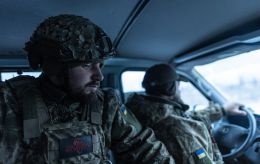Problems for Ukraine's allies? What Putin brought back from Asia
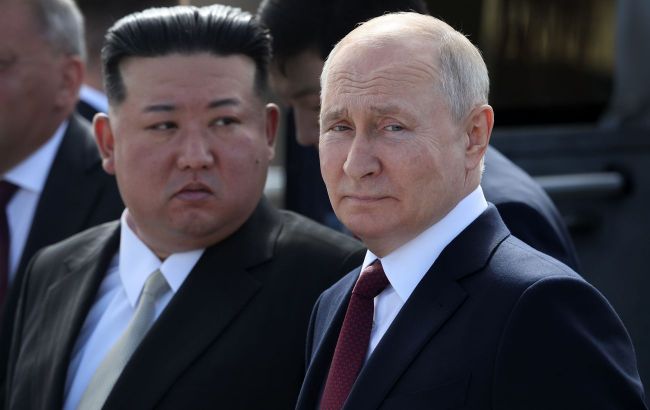 Kim Jong Un and Vladimir Putin (Getty Images)
Kim Jong Un and Vladimir Putin (Getty Images)
Russian President Vladimir Putin has made another tour, visiting two Asian countries - North Korea and Vietnam. The outcomes of these trips are different, but both will definitely have consequences, particularly for Ukraine.
Contents
- Results of Putin's visit to North Korea
- Challenges arising for East Asia and Ukraine
- World's reaction to increased cooperation between Russia and North Korea
- Reasons for Putin's trip to Vietnam and what he brought back
Results of Putin's visit to North Korea
Despite the usual North Korean pathos of parades, portraits all over the city, and flowers with balloons, the main happened on paper. Russia and North Korea signed a comprehensive strategic partnership agreement.
As stated in the text of the document, "If one of the parties is subjected to an armed attack by any state or several states and is thus in a state of war, the other party will immediately provide military and other assistance by all means at its disposal." This creates conditions for the direct involvement of DPRK troops in the war against Ukraine.
According to the agreement, Russia and North Korea will oppose "unilateral coercive measures," including extraterritorial ones. There is one more important point - "interaction to jointly confront challenges and threats in areas of strategic importance."
Although Russia and North Korea have been cooperating directly in the military field since at least the end of 2023, the agreement takes their relations to a new level.
"The main feature of this document is that the DPRK and the Russian Federation have actually pledged to protect each other from aggression. It may mean that North Korea will be more involved in the Russian-Ukrainian war. This is possible, for example, through the expansion of arms supplies, ranging from artillery, military equipment, and the sending of so-called North Korean volunteers. Most likely, for construction work near the front," Anton Hanotskyi, an expert on Asian politics at the Adastra think tank, told RBC-Ukraine.
The Russian leader said that there was no need to attract manpower from North Korea.
"We are not asking anyone, no one has offered it to us, so there is no need," Putin said at a briefing in Vietnam.
Meanwhile, Russia is massively recruiting mercenaries all over the world to directly participate in the war against Ukraine.
Challenges arising for East Asia and Ukraine
Not only Ukraine will feel the consequences of the strengthening of the alliance between Russia and North Korea.
This alliance is also important because it can pose a threat to the United States and its allies that are close to North Korea: Japan, South Korea, and Taiwan.
"Not only will North Korea supply weapons, but Russia will also help modernize the DPRK's armed forces. Especially its nuclear triad (strategic offensive forces that can carry nuclear weapons - ed.), that builds up this destabilizing factor in the region," said Anton Hanotskyi.
The expert does not rule out that some kind of provocation on the Korean Peninsula could have been discussed behind closed doors to divert the West's attention from Russian aggression in Ukraine. Moreover, the soil probing has already begun.
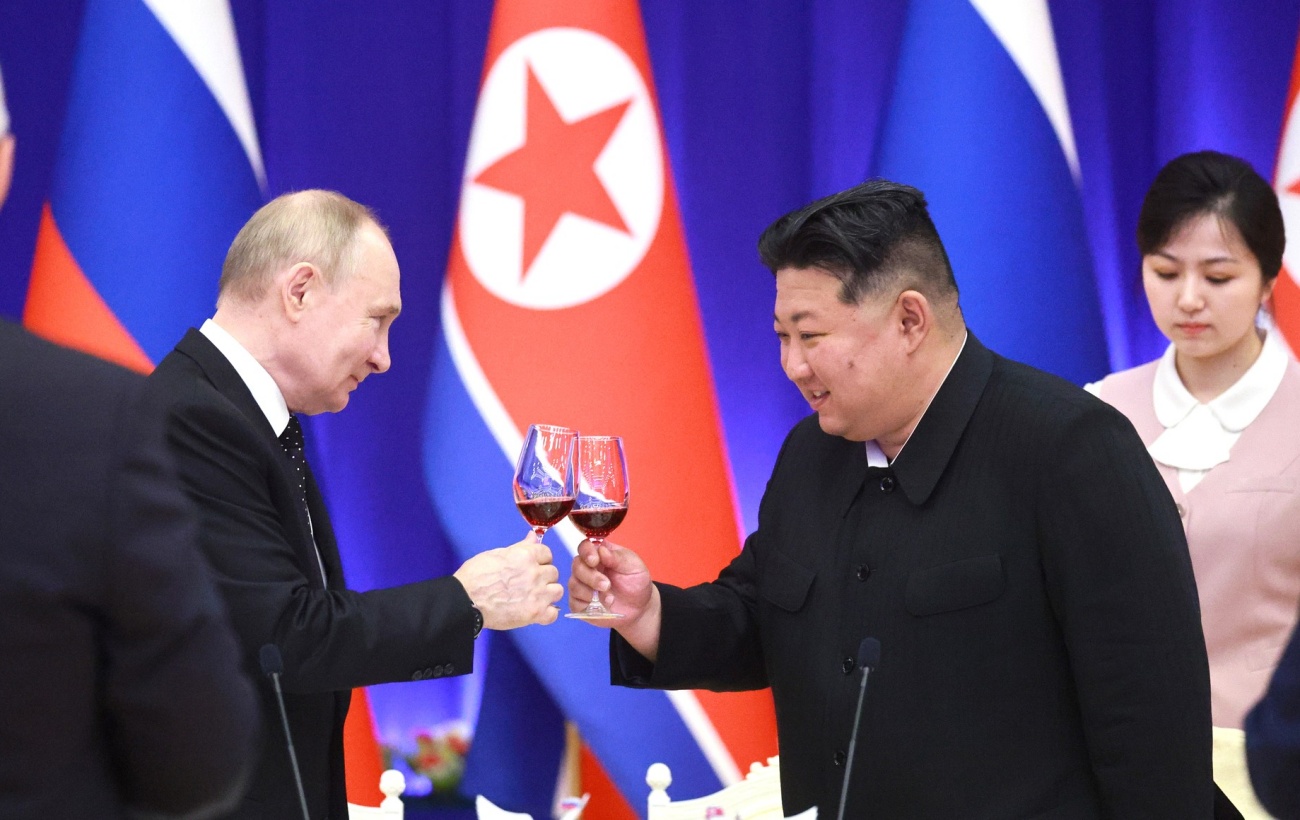
Putin signs an agreement with Kim Jong Un (photo: kremlin.ru)
On June 18, about 30 North Korean soldiers briefly crossed into South Korea. In response, South Korean soldiers opened warning fire. The North Koreans then returned to their side of the border. This is the second such incident in the last two weeks.
RBC-Ukraine's intelligence sources say that Russia could have promised to transfer technology to the DPRK. The most serious things in question are missile technology and submarines.
In response to all these steps, South Korea plans to reconsider its ban on supplying lethal weapons to Ukraine, according to the local Yonhap News. Specific details are not yet known, but there are some pitfalls.
"South Korea is in a political crisis. The parliament is controlled by the opposition, which is not very eager to supply weapons and generally takes a partially pro-Chinese and even slightly pro-Russian position. For example, South Korean President Yoon Suk Yeol is in favor of supporting Ukraine, talking about supplying non-lethal aid. But given that the opposition in the parliament is blocking any talks about weapons, no serious progress is expected in this area at the moment," emphasizes Anton Hanotskyi.
Therefore, it is more likely that South Korean arms supplies will increase through third countries. There have already been cases that South Korea sent ammunition to replenish warehouses in the United States. And the United States has provided its own shells for Ukraine.
World's reaction to increased cooperation between Russia and North Korea
Several top officials from different countries have already reacted to the strengthening alliance between Moscow and Pyongyang.
NATO Secretary General Jens Stoltenberg says that the Alliance is concerned about the assistance that Russia could provide to North Korea's missile and nuclear programs.
In the United States, Michael Carpenter, Director for Europe at the White House National Security Council, noted that the Russia-North Korea agreement increases the threat to Ukraine and European security.
"Russia's closest partners in the world are North Korea, Iran, Syria, and then to a certain degree, to a different degree, the People’s Republic of China, which is not providing Russia with weapons but which is providing a lot of the dual-use products that go into the production of advanced weapons systems," Carpenter said.
Mykhailo Podolyak, advisor to the head of the Presidential Office of Ukraine, is convinced that the signing of the agreement between Putin and Kim Jong Un is "a unilateral and most impudent nullification of the entire package of international decisions, resolutions and restrictions imposed on the DPRK."
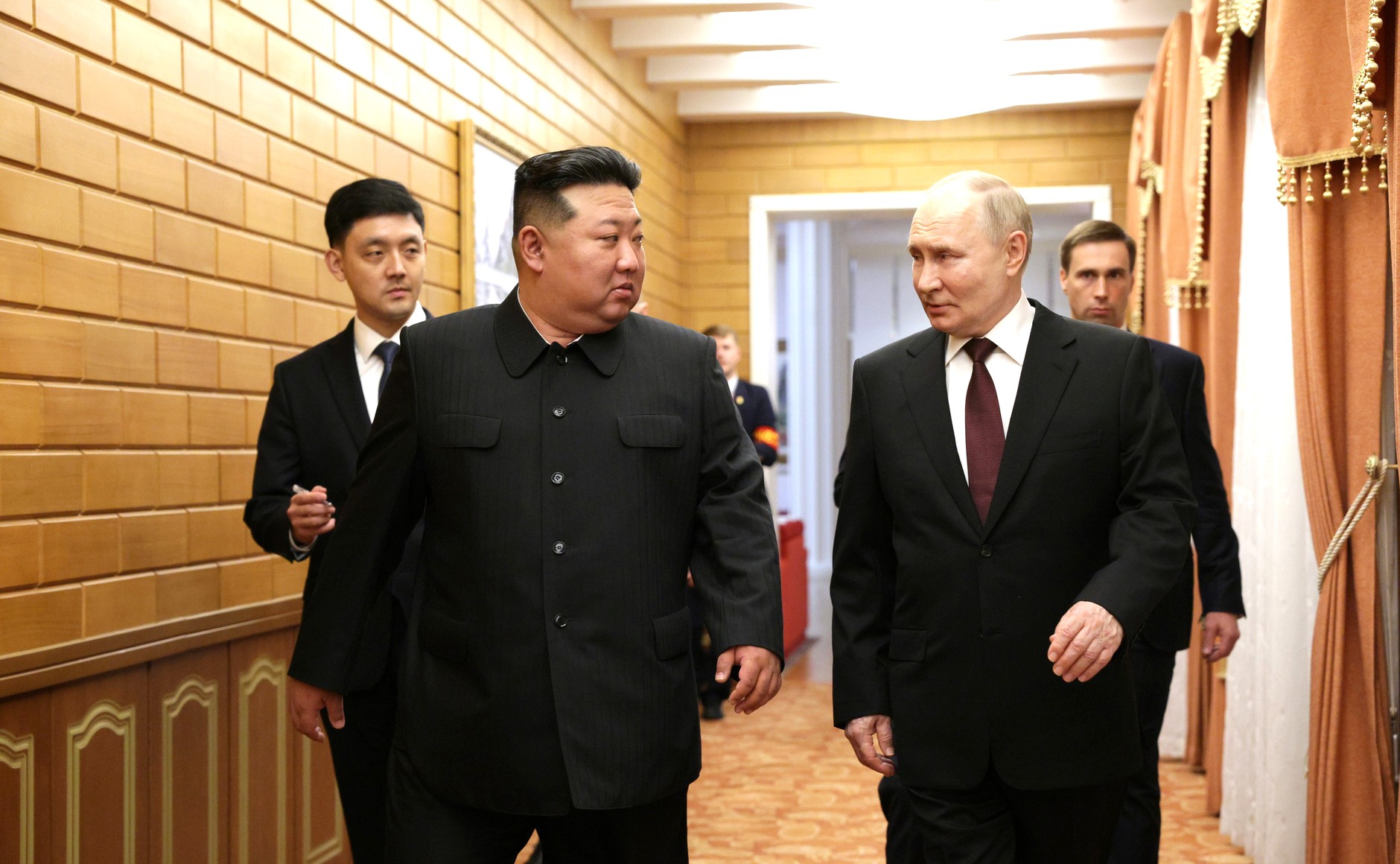
The world reacts to Russia's cooperation with the DPRK (photo: kremlin.ru)
But after tough statements, actions are needed. And there are two approaches. The first is to further tighten sanctions against North Korea. How effective it can be is a separate topic for discussion, as a significant part of the DPRK's economic ties with the world is carried out through China. Accordingly, sanctions will not work well without China's assistance.
The second approach is to try to tear North Korea away from Russia by playing on Kim Jong Un's emotions and ambitions. The United States tried to follow this path during the presidency of Donald Trump. But it failed to succeed. Since 2016, there have been two personal meetings between then-US President Donald Trump and DPRK leader Kim Jong Un. There were few concrete results. In the end, just before the 2020 US election, the North Korean Foreign Ministry said that "there is nothing more hypocritical than an empty promise." Kim Jong Un did not have a dialog with the new US President Joe Biden at all.
So in recent years, North Korea has turned toward Russia and China.
"I have often heard this during official talks with North Korean interlocutors: North Korea wants normal relations with the United States," says Joseph DeTrani, former CIA director of East Asian Operations and former Special envoy for negotiations with North Korea. "The problem was - and is - that North Korea wants normal relations and recognition as a nuclear power. Just like we dealt with the nuclear issue in Pakistan. North Korea was told that we would not accept it as a nuclear power. Full verifiable denuclearization is the way to normal relations, they were told."
Presumably, the time for Western negotiations with North Korea has already been missed. Besides, against the backdrop of the US presidential election, there are doubts that we will see any real steps relating to the DPRK.
Reasons for Putin's trip to Vietnam and what he brought back
Putin's visit to Vietnam has some different connotations. Unlike North Korea, this country is not considered an outcast in the world. On the contrary, Vietnam is trying to take an equidistant position from its neighbor China and flirt with the United States, Russia, and the European Union. One should view Putin's visit from this perspective.
"During the visit, they mainly discussed economic issues. Russia really wants Vietnam to sign a free trade agreement with the Eurasian Economic Union. This way, it would strengthen trade cooperation and expand Russia's economic presence in the region. In other words, Vietnam serves as something like a gateway to Southeast Asia for Russia," Anton Hanotskyi notes.
Russia is primarily interested in investments that will allow it to supply dual-use goods for the defense industry from Vietnam. And of course, the potential for circumventing sanctions.
During the visit, Russia and Vietnam signed other documents, including those on expanding cooperation in the energy sector and on research in nuclear science and technology.
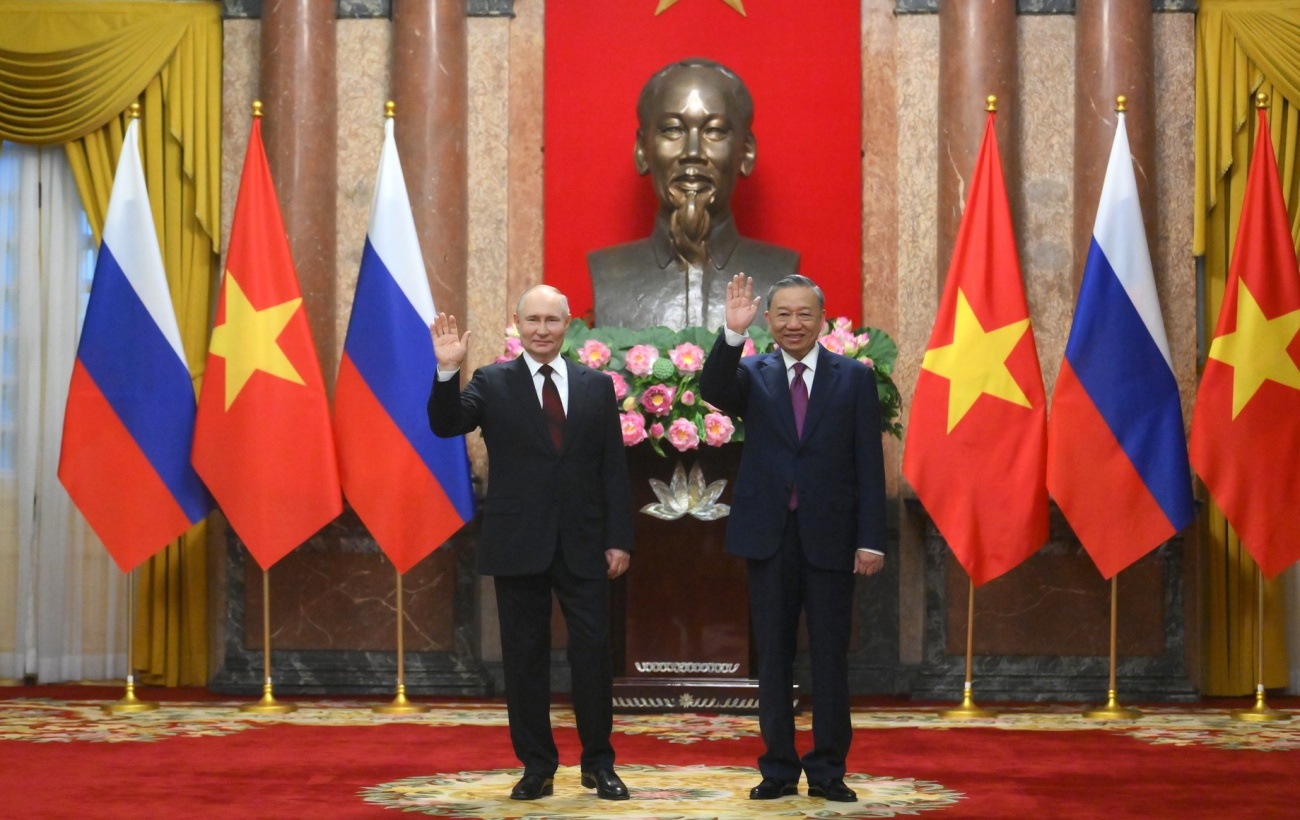
Putin visits Vietnam after the DPRK (photo: kremlin.ru)
Another important area is the supply of weapons. Over the past decades, Vietnam has been one of the largest buyers of Russian equipment. Among other things, these include Bastion coastal defense systems, S300 PMU-1 anti-aircraft missile systems, radars for aviation and maritime equipment, and Su-30MK2 fighters with appropriate missile weapons.
Recently, Russia has been looking for weapons around the world to continue the war. So one cannot rule out that behind closed doors, they could have discussed returning previously delivered weapons from Vietnam. But the chances that Vietnam will take such a step are slim.
"If Vietnam agrees to return at least some of the weapons back to Russia, it will have an extremely negative impact on relations with the United States. We know that Vietnam is becoming a kind of hub for American companies that are moving their production facilities from China. Right now, the Vietnamese leadership does not need this confrontation with Washington, given its economic interests," Anton Hanotskyi says.
Putin's Asian tour is an example of how the Russian autocrat can create problems for Ukraine's allies. Further developments will depend on how prompt and decisively they react.
Sources: excerpts from the Russia-North Korea treaty, open-source comments by NATO Secretary General Jens Stoltenberg, Director for Europe at the White House National Security Council Michael Carpenter, Advisor to the Head of Ukraine's Presidential Office Mykhailo Podolyak, former US Special envoy for negotiations with North Korea Joseph DeTrani, and comments by Anton Hanotskyi, Asian politics expert at Adastra think tank.
